5 Grocery Store "Cheeses" That Aren't Actually Cheese
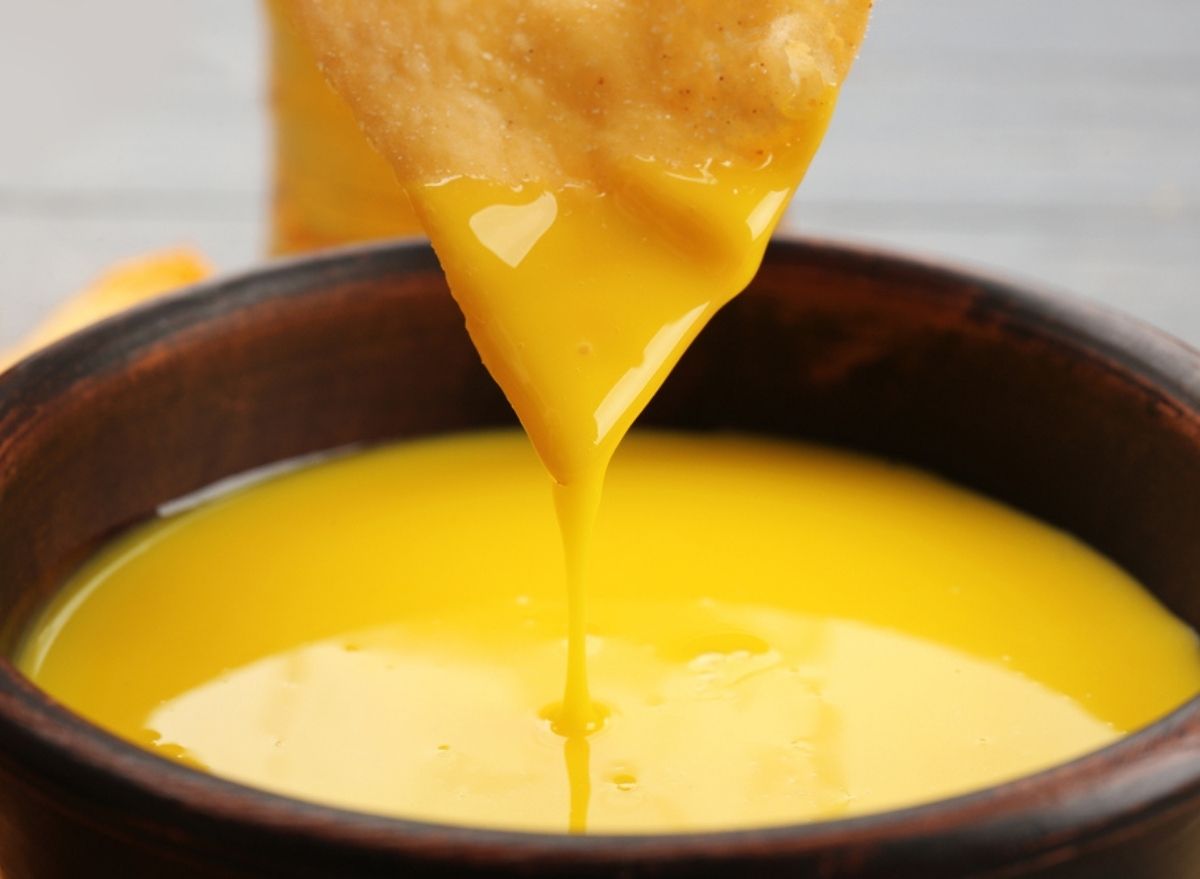
Cheese: it's fun at parties, goes great on sandwiches and salads, and becomes a thing of godlike beauty when you melt it. It's no wonder that charcuterie boards have grown in popularity in recent years. Is there anything better than a wooden slab topped with brie, manchego, gouda, a few cornichons, and a good glass of wine?
But then there's a whole other category of cheese-like items commonly found at the supermarket–call them cheese products, fake cheese, or cheese adjacent—that are simply not even close to the real thing. Oh, they might look like cheese. They might taste like cheese, too. They might even have the word "cheese" in the brand name. But make no mistake, these items are so estranged from the genuine article that manufacturers are legally required to label them differently on the package.
The U.S. Food and Drug Administration (FDA) sets the rules for what qualifies as cheese and what doesn't. For instance, a product must contain at least 51% real cheese just to be labeled as a "pasteurized process cheese food." Anything that falls below that barely half-cheese standard may be considered a "cheese product," a popular term that has no legal definition and gives food companies a lot more leeway to add ingredients that are not allowed in even processed cheese.
Is there a place for fake cheese in a modern world so obsessed with real ingredients? Does it sometimes just hit the spot, in spite of its phoniness? These are questions you'll have to answer for yourself, in the dark at night, right before you fall asleep. In the meantime, let's call out these cheese wannabes with all their unpronounceable ingredients and unnatural colors.
Velveeta
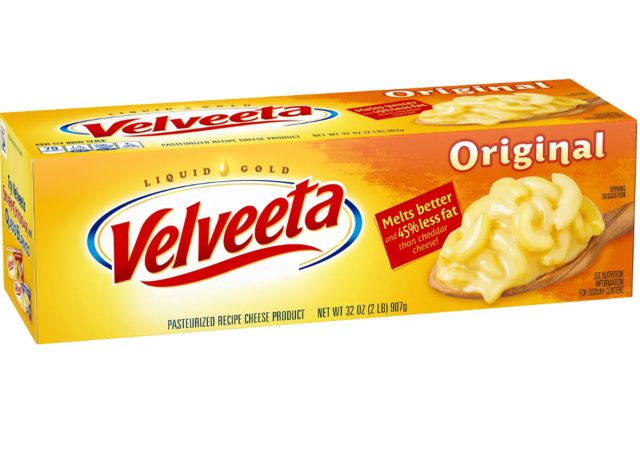
Velveeta, made by Kraft, is a cheese-like product that contains emulsifiers that hold it together and make it so creamy and spreadable. It has a mild flavor and an unmistakable yellow-orange color that even kids probably know is not real cheese. Still, Velveeta has a wonderful texture that makes it ideal for many dips (add some Ro-Tel tomatoes and green chilies to make queso). It's sold in a block, but you can also buy it in a boxed mac n' cheese variety with a squeezable pouch that gets poured over the pasta. Any cheese that you can squeeze is probably not legit, so buyer beware.
Back in 2002, the FDA cited Kraft for mislabeling Velveeta as a "pasteurized process cheese spread" because it contained milk protein concentrate, an ingredient not allowed under the rules. Did Kraft change the recipe? Nope. Instead, it changed the label, opting for the less regulated "cheese product" descriptor.
Kraft Singles
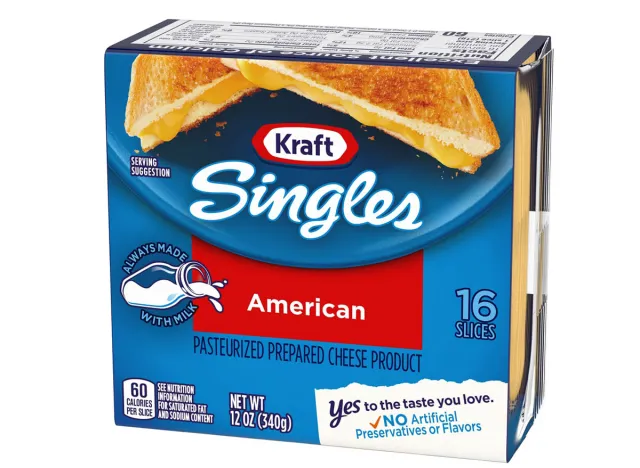
They go great on burgers, inside a grilled cheese sandwich, or just eaten by hand if you are five years old. But are Kraft Singles actually cheese? Well, technically, there is cheddar in there, but so are a lot of other ingredients that are, well, definitely not cheese. We're talking about things like milk protein concentrate, whey, calcium phosphate and sodium phosphate. C'mon, you didn't think that plasticy, ooey gooey texture was natural, now did you?
Like Velvetta, Kraft Singles previously drew FDA scrutiny for failing to live up to labeling standards. The company then switched from calling it a "cheese food" to a "cheese product."
Kraft Parmesan
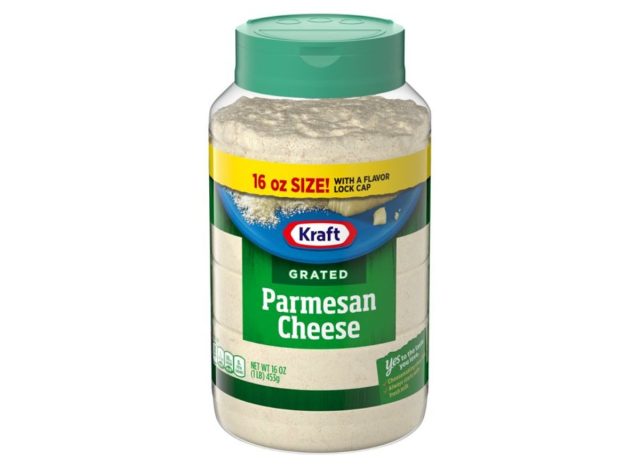
Kraft's grated parmesan is a little different from some of the food giant's other so-called cheese products. It actually meets the U.S. definition of cheese–it's just not real parmesan cheese. Not by strict Italian standards, anyway. Genuine Parmigiano-Reggiano can only have three ingredients: milk, salt, and rennet. American imitations like Kraft's contain a lot more than that. These include one dubious ingredient in particular—cellulose, a filler made from wood pulp, which is used to keep cheese from clumping.
According to The Counter, Kraft and several other companies spent years in court battling claims of false advertising over the filler's presence in products labeled as "100% Grated Parmesan Cheese." Notably, the newer packaging no longer includes the "100%" language. Next time, skip the green shaker bottle. Grab a block of real Parmigiano and a cheese grater instead.
Cheez Whiz
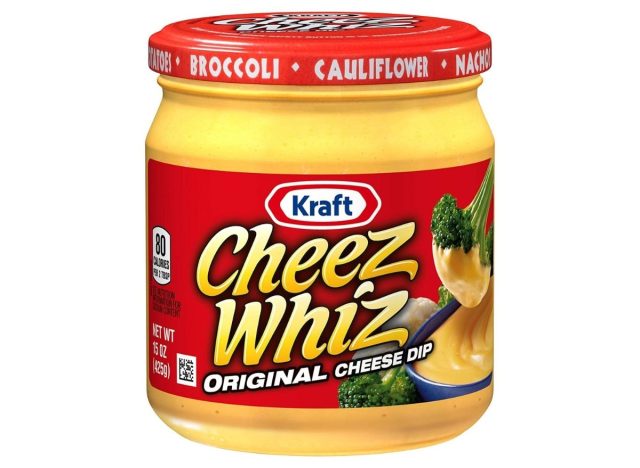
Whether you use it as a nacho-style cheese dip or the topping for your Philadelphia-style cheesesteak, Cheez Whiz is an iconic American junk food that few, if any, informed consumers could reasonably mistake for real cheese. What, did the unconventional spelling give it away?
Its artificiality is so plainly obvious that Kraft doesn't even bother with a "cheese product" disclaimer on the label. The lengthy list of ingredients includes whey, canola oil, maltodextrin, milk protein concentrate, sodium phosphate…need we continue? This is the kind of stuff you can't tell your doctor you've been eating—especially if that doctor is a cheese connoisseur.
Easy Cheese
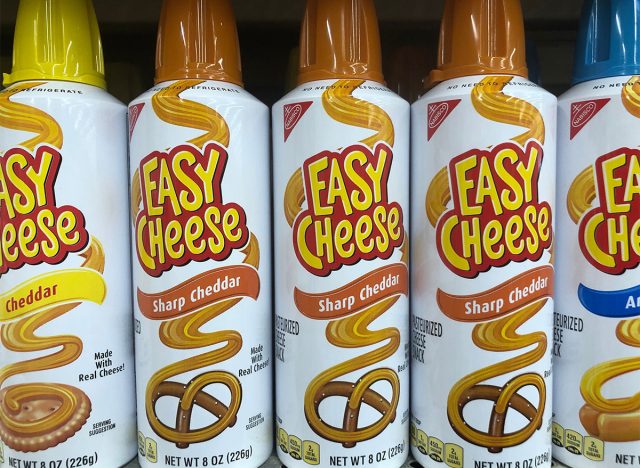
It may be easy–but it ain't real cheese! The spray can from Mondelēz International may be fun to spatter onto crackers, but this so-called "pasteurized cheese snack" (another legally undefined term) is so far from real cheese it's not even in the same realm. Cheddar is, in fact, listed among the ingredients, but only after whey, canola oil, and milk protein concentrate in order of appearance. The list further includes lactic acid, sodium alginate, and sorbic acid as a preservative. (Dare we even ask how bacon flavor gets into the Cheddar n' Bacon variety?)
If aerosol is your thing, save it for hairspray. Put a nice piece of Gruyere on a cracker instead. It may not have that pretty floral pattern, but trust us, it's just better.









